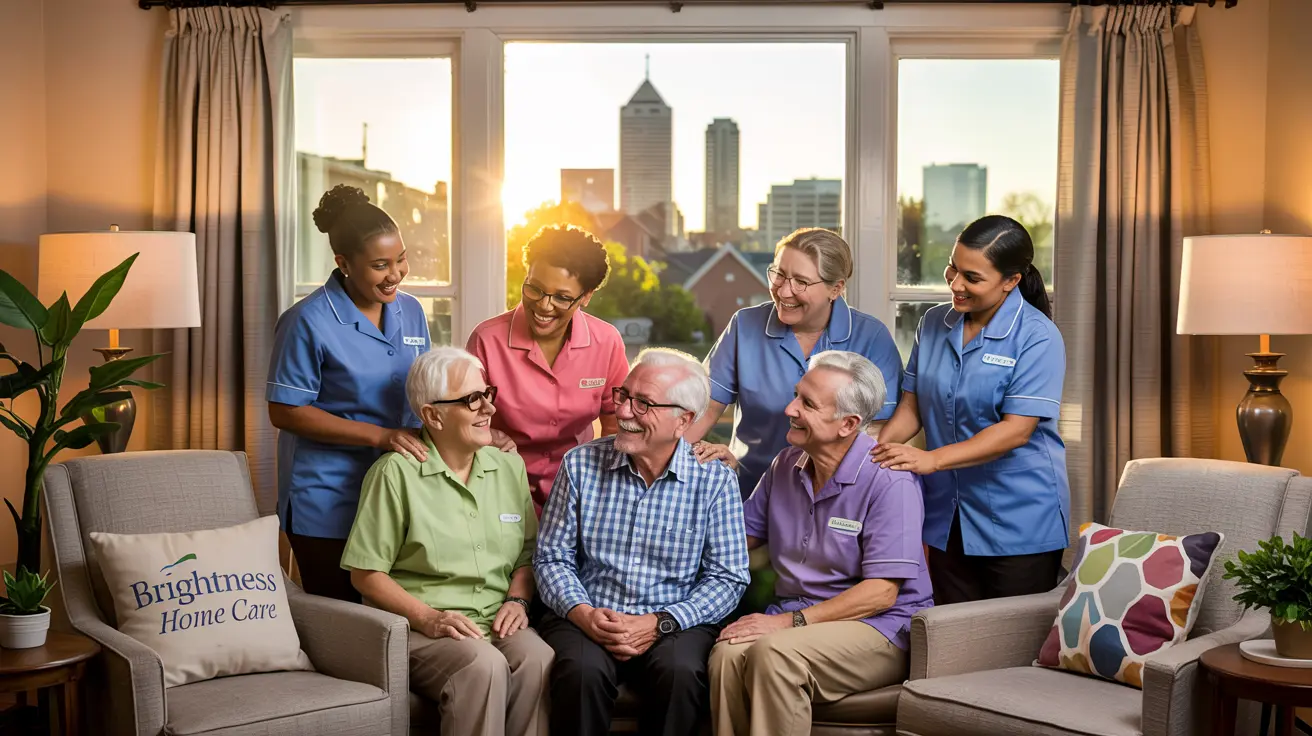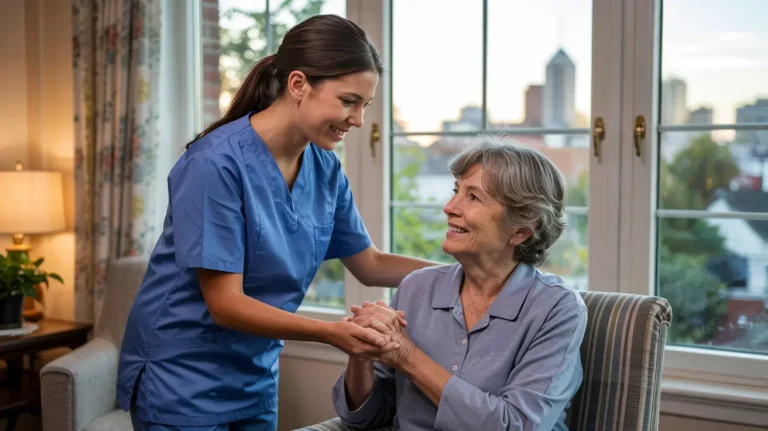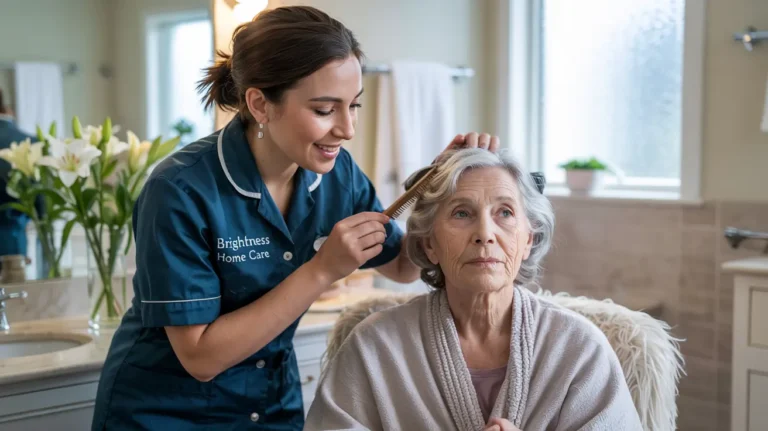Ultimate Guide to Cultural Personal Care Services in Indianapolis
Did you know that Indianapolis is home to over 120 different cultural and ethnic groups? That’s right! Our city has become a vibrant melting pot of traditions, languages, and customs. This diversity is something I’ve grown to appreciate deeply, especially when it comes to providing personal care services.
I remember when I first started working in home care years ago. I made so many embarrassing mistakes! I once brought a pork dish to an elderly Muslim client without thinking about dietary restrictions. Talk about a facepalm moment! It taught me an important lesson that I never forgot: personal care isn’t just about physical assistance—it’s about respecting who people are at their core.
That’s why I’m so passionate about culturally-sensitive care approaches. When someone enters your home to help with your most personal needs, they should understand and honor your cultural background. It’s not just nice—it’s necessary!
In this article, I’ll share everything I’ve learned about cultural personal care in Indianapolis and how Brightness Home Care LLC, located at 4911 West 38th Street in Indianapolis, has become a leader in providing care that truly respects diverse traditions and needs. Whether you’re looking for care for yourself or a loved one, understanding these cultural considerations could make all the difference in finding the right fit.
Understanding Cultural Sensitivity in Personal Care
Cultural sensitivity in personal care means recognizing, respecting, and responding to the cultural preferences, beliefs, and practices of individuals receiving care. It’s about more than just being “nice”—it’s about dignity and respect at the most fundamental level.
I’ve seen firsthand how cultural misunderstandings can create unnecessary stress for clients. One time, I was training a new caregiver who couldn’t understand why an Indian client insisted on washing herself daily despite mobility issues. The caregiver thought she was being difficult! I had to explain that in many Indian traditions, daily bathing has spiritual significance beyond just cleanliness.
Indianapolis has been changing so much over the decades. We now have significant communities from Asia, Africa, Latin America, and the Middle East, among others. Each brings their own rich traditions around health, family, food, and personal care. Based on recent community surveys, about 15% of Indianapolis seniors requiring home care come from culturally diverse backgrounds—and that number is growing!
When we provide care that aligns with someone’s cultural identity, we see amazing benefits. Clients are more comfortable, more trusting, and honestly, they just do better overall! They eat better, follow medical advice more consistently, and report higher satisfaction with their care. It’s not rocket science—people thrive when their identity is respected.
The flip side is pretty rough. I’ve stepped in to help families who previously had caregivers who dismissed or ignored cultural practices. The clients often became withdrawn, depressed, or even combative. One elderly Korean gentleman refused to eat for days because his previous caregivers wouldn’t accommodate his preference for traditional Korean breakfast foods. Such a simple thing caused so much unnecessary suffering!
Cultural Dietary Preferences and Personal Care
Food isn’t just nutrition—it’s identity, comfort, and sometimes even medicine! I can’t tell you how many times I’ve seen a client’s face light up when served a dish that reminds them of home. It’s like magic!
Different cultural groups have specific dietary practices that caregivers need to understand. For instance, many Hindu clients may be vegetarian. Muslim and Jewish clients might observe halal or kosher dietary laws. Various Asian cultures may have specific beliefs about “hot” and “cold” foods that affect health.
At Brightness Home Care, we really make an effort to get this right. I remember one client from Ethiopia who had been refusing to eat much with her previous care service. When our caregiver learned to make simple injera (Ethiopian flatbread) and doro wat (spiced chicken stew), the client started eating properly again! Her daughter nearly cried with relief at our team meeting.
We’ve found that taking detailed notes about food preferences during our initial assessment makes a huge difference. Our caregivers can learn to prepare simple cultural dishes or work with family members who might drop off traditional foods. Sometimes it’s as simple as knowing how to heat and serve these foods properly.
I made a mess of this once with a Chinese client! I reheated some leftover dumplings his daughter had brought, but I completely overcooked them. He was too polite to complain, but his daughter later explained the right way to steam them. We all live and learn!
Religious Practices and Personal Care Considerations
Indianapolis has become home to a wide array of religious traditions—everything from various Christian denominations to Islam, Hinduism, Buddhism, Sikhism, and Judaism, among others. Each religion may have specific practices that affect daily routines.
Religious observances can significantly impact care scheduling. For example, Muslim clients may need assistance with wudu (ritual washing) before prayer times. Jewish clients observing Shabbat might require certain tasks to be completed before sundown on Friday. Some Hindu clients might perform morning puja (worship rituals) that shouldn’t be interrupted.
I once worked with a devout Catholic client who needed to attend Mass every Sunday. We made sure to schedule her bath and dressing assistance early enough so she would never miss it. These small accommodations meant the world to her!
Caregivers also need to respect religious objects and spaces in the home. Prayer rugs, religious statues, altars, or sacred texts should be treated with appropriate reverence. I cringe thinking about the time a new caregiver used a client’s prayer shelf to store medication bottles! Thankfully, we quickly corrected the situation.
At Brightness Home Care, all our caregivers receive training on the major religious traditions represented in Indianapolis. We emphasize that these aren’t just “preferences”—for many clients, these practices are essential to their spiritual well-being and identity.
Language and Communication Across Cultures
Did you know that over 80 languages are spoken in Indianapolis homes? That diversity is beautiful but can create real challenges in care settings!
Language barriers can lead to misunderstandings about medications, care instructions, or personal preferences. I’ll never forget a Spanish-speaking client who kept refusing her medication until we realized she thought it was being offered at the wrong time because of a simple translation error.
Brightness Home Care has built a team that includes caregivers who speak some of the most common languages in our community, including Spanish, Mandarin, Arabic, and several African languages. When we can match a client with a caregiver who speaks their primary language, the difference in comfort level is immediate and obvious.
For languages we don’t cover in-house, we maintain relationships with translation services and use technology solutions like translation apps. These aren’t perfect, but they help bridge the gap. I’ve literally seen clients’ shoulders relax when they hear their native language spoken.
Building trust across cultural and language differences takes time and patience. Simple gestures matter—learning a few important words in a client’s language, respecting communication styles (some cultures value indirect communication, while others prefer directness), and being attentive to non-verbal cues are all crucial skills our caregivers develop.
Cultural Approaches to Health and Wellness
Many cultures have traditional healing practices that exist alongside conventional Western medicine. I’ve worked with clients who use everything from traditional Chinese medicine and ayurvedic practices to indigenous herbal remedies.
The smart approach isn’t to dismiss these traditions but to find ways to integrate them safely with conventional care. One client’s daughter would prepare special healing teas that complemented her mother’s diabetes medication. The doctor approved, and it gave the client comfort that wasn’t just physical but cultural and emotional.
Cultural beliefs about health and illness vary widely. Some cultures might view certain conditions as spiritual issues rather than medical ones. Others might have specific beliefs about what causes illness or how recovery happens. A Filipino client once explained to me that her culture views illness as an imbalance of “hot” and “cold” forces in the body—a concept I hadn’t encountered before.
Family decision-making structures also differ across cultures. In some traditions, important health decisions are made collectively by the family rather than by the individual alone. I learned this lesson the hard way when I kept directing questions to an elderly Chinese client about her care preferences, not realizing I was unintentionally disrespecting the family’s decision-making process.
At Brightness Home Care, we’ve developed approaches that bridge different health perspectives. We work with clients’ traditional healing practices while ensuring they’re receiving necessary conventional care. It’s not always easy, but the results speak for themselves in client well-being.
Personal Care Practices Across Different Cultures
Personal care—bathing, grooming, toileting—is where cultural differences become most apparent and where sensitivity is most important. These intimate activities are surrounded by cultural norms about modesty, gender, and hygiene.
Bathing practices vary significantly across cultures. Some Asian traditions might prefer sponge baths or washing with a basin rather than submersion in a tub. Some cultures have specific sequences for washing different body parts. I remember a Japanese client who was uncomfortable with our standard bathing procedure until we adapted to something closer to what she was accustomed to.
Gender considerations are particularly important. Many cultures have strict norms about members of the opposite sex providing personal care. At Brightness Home Care, we always try to accommodate gender preferences for caregivers when it comes to personal care tasks.
Modesty concerns also vary widely. Some clients may want to remain partially clothed during bathing. Others might have specific requirements about covering certain parts of the body at all times. I once worked with a Muslim woman who needed to keep her hair covered even during personal care, which required some creative approaches to hair washing!
Our caregivers receive specific training on diverse cultural approaches to personal care. We emphasize adaptability and the importance of asking rather than assuming. I always tell my team that it’s better to ask a question that might seem obvious than to make a cultural misstep during such intimate care.
How Brightness Home Care Provides Culturally-Sensitive Services
At Brightness Home Care, located at 4911 West 38th Street in Indianapolis, cultural competency isn’t just a buzzword—it’s built into everything we do. Our caregivers complete a comprehensive cultural sensitivity training program that covers major cultural groups in Indianapolis, religious practices, dietary considerations, and communication strategies.
The matching process between clients and caregivers is something we take very seriously. We consider language compatibility, cultural background, religious alignment, and gender preferences. It’s like matchmaking, but for care! When we get it right, the relationship between caregiver and client flourishes.
Every care plan we develop is customized to incorporate cultural preferences. During our initial assessment, we gather detailed information about dietary needs, religious practices, communication styles, and personal care preferences. These aren’t treated as optional “extras” but as essential components of quality care.
I wish you could see the difference this approach makes! One daughter of a client from India told us, “For the first time, my mother doesn’t have to explain herself or feel like an inconvenience when she asks for things to be done her way.” That’s exactly what we’re aiming for—care that feels natural and respectful.
Our location in Indianapolis makes us accessible to diverse communities throughout the city. We’ve built connections with cultural centers, religious institutions, and community organizations serving various ethnic groups. These relationships help us better understand the needs of different communities and refine our approaches.
Conclusion
Cultural sensitivity in personal care isn’t a luxury—it’s a necessity for providing truly compassionate and effective support. Throughout my years in this field, I’ve seen how honoring someone’s cultural identity can transform their care experience from merely adequate to truly healing.
Brightness Home Care LLC has made cultural competence a cornerstone of our approach because we’ve seen the difference it makes. Every person deserves care that respects not just their physical needs but their whole identity—including their cultural background.
When looking for personal care services in Indianapolis, I encourage you to consider how providers address cultural factors. Ask specific questions about how they accommodate dietary preferences, religious practices, language needs, and cultural approaches to personal care. The answers will tell you a lot about their commitment to truly personalized care.
If you or a loved one could benefit from culturally-sensitive personal care services in Indianapolis, reach out to Brightness Home Care. Our team is ready to develop a care plan that honors your unique cultural background and personal preferences.
I’d love to hear about your experiences with cultural considerations in care settings! What practices or approaches have made a difference for you or your loved ones? Your insights could help others navigate this important aspect of finding the right care.







